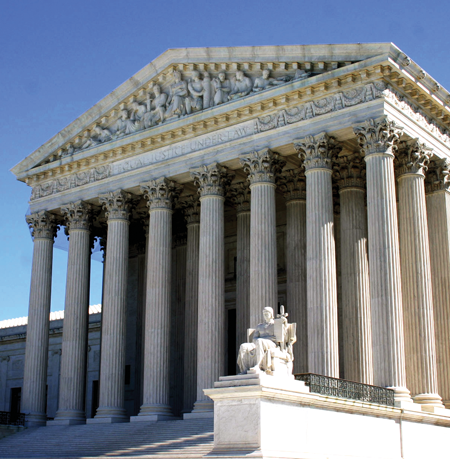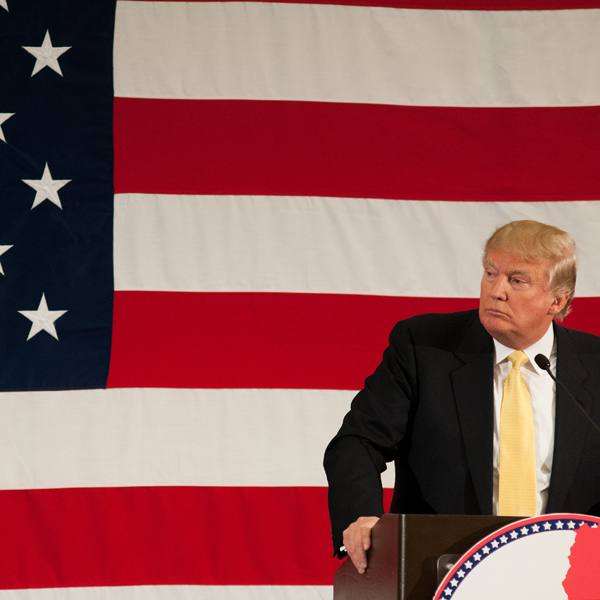Can Trump triumph in the Supreme Court? Presidents’ rates of winning cases have been declining

Flickr Creative Commons
It’s only a matter of time before President Donald J. Trump’s administration puts its stamp on the federal government’s cases in the U.S. Supreme Court. But can it top the relatively low batting average that President Barack Obama’s administration recorded over the last eight years?
Or how about that of President Zachary Taylor, who died in office in 1850 after more than a year?
A new study—The End of Supreme Court Deference to the President? by two law professors with a bent for political science and empirical research on the judiciary—suggests that if trends continue, Trump might fare no better than Obama, who had a win rate of 50.5 percent in cases in which the federal government was a party.
“This is the worst record of any president in our data set; and it may be the worst since the Zachary Taylor administration,” says the report by Lee Epstein of Washington University in St. Louis and Eric Posner of the University of Chicago.
Taylor’s success rate was about 41 percent, based on the authors’ preliminary analysis of data from that era.
Back to FDR
The pair didn’t actually study the presidents’ Supreme Court batting averages going all the way back to Taylor’s era. Their data set included orally argued cases that resulted in a signed opinion or a judgment from the 1932 to 2015 terms in which the United States, an executive branch actor or a federal agency was a party. The study didn’t cover the many cases in which the federal government, through the solicitor general’s office, is an amicus in the court.
The professors say that on the whole, the data confirms what scholars have long assumed: When a president goes to the Supreme Court, he wins.
“Over the course of the 84 terms and 13 presidents in our data set, presidents prevailed in nearly two-thirds of their cases,” Epstein and Posner wrote in the study, which was released Jan. 20—Inauguration Day.
But their work also reveals a declining win rate since President Ronald Reagan’s administration in the 1980s. The pre-Reagan success rate was 65 percent, while the Gipper enjoyed a 75 percent rate over the course of his two terms. Since then, the overall success rate for presidents has been 60 percent, with Obama’s average even lower.
“I think the most striking finding is how badly the Obama administration has done,” Posner says. “The question is why?”
More than a few observers have suggested that, despite major victories in high-profile cases involving same-sex marriage, abortion, affirmative action and the Affordable Care Act, the Obama administration overreached in other areas of the law and was smacked down by the high court.
“Obama pushed the envelope on agency and executive actions that then got challenged in court,” says Ilya Shapiro, a senior fellow in constitutional studies at the Cato Institute in Washington, D.C.
Shapiro notes that during the 2015-2016 term—the last one covered by the Epstein-Posner study—the Obama administration won 13 cases and lost 14, with 10 of the losses failing to garner a single justice’s vote.
Shapiro cites cases such as McDonnell v. United States, decided in 2016, in which the court unanimously reversed the conviction of a former Virginia governor on the basis that meeting with constituents who seek favors is not one of the “official acts” that can be prosecuted under public-corruption statutes.
He also cites a 2012 decision, Hosanna-Tabor Church v. EEOC, in which the court unanimously rejected the agency’s interpretation of the “ministerial exception” to civil rights laws.
Decline in Deference?
Epstein and Posner say in the study that their research suggests a deeper trend at work, that “Obama was just the latest victim of a court growing less and less deferential to the executive branch.”
“Some commentators believe that recent presidents, starting with Reagan, have aggressively asserted executive power based on strained interpretations of the Constitution and of statutes,” the study says. “It is possible that the court has responded by ruling against presidents with more frequency.”
But Posner pushes back against that theory, saying that presidents have been “making aggressive claims about their power for at least 100 years.”
He points to a couple of other potential explanations for the lower success rate of recent presidents. “There is evidence to suggest the court is more willing to strike down federal statutes than in the past,” Posner says. “The court has become more assertive about its understanding of the Constitution.”
Then there is the theory that the rise in the last 20 years or so of the specialized Supreme Court bar—appellate litigators who frequently argue before the justices, including several former solicitors general—has been a counterweight to the quality of the representation that the solicitor general’s office provides.
“The legal profession is putting more resources into winning at the Supreme Court,” Posner says. “The SG’s office has stayed about the same, while the Supreme Court bar has gotten better.”
The study also suggests that a natural explanation for the declining win rate is greater ideological distances between the court’s center and recent presidents.
But the ideological distance today between the president and the pivotal justice on the court is hardly unprecedented, the study says. Many others with strong success rates in the court, including Presidents Jimmy Carter and Reagan, “were equally if not more distant from the pivotal justice,” according to the study.
Donald B. Verrilli Jr., who was Obama’s solicitor general for five years until he stepped down at the end of the term last June, has often suggested there is a difference of significance between an administration’s overall batting average and whether it wins the big games, or issues.
“We’ve won some. We’ve lost some,” Verrilli told the PBS NewsHour last year. “But I think we’ve won most of the big, important cases—health care, marriage equality. I think on most of the cases that really matter ... from a historical perspective, that we’ve done pretty well. … We managed to persuade a court—a majority of whose members, before Justice [Antonin] Scalia passed away, you would say are conservative—that we had the right answer on the law on the big cases.”
Trump at bat
The solicitor general’s office was to argue several cases in February in which the federal government was a party, and it has more slated for later in the term. Trump had yet to name his solicitor general as this story went to press. But Noel J. Francisco, a conservative Washington litigator, took over as acting solicitor general once Trump took office.
Controversies such as the January executive order suspending immigration from several countries for 90 days—and the quick litigation that ensued—suggested to some observers the Trump administration will soon enough have its own hot-button issues reach the Supreme Court.
“I have no idea what’s going to happen in this administration” when it comes to its success rate before the justices, Posner says. “It would be easy to imagine Trump doing worse than any recent president.”
Still, he adds: “But that might be for Trump-specific reasons, such as being sloppy on its execution of executive orders and policies. One suspects the Supreme Court is going to be pretty skeptical of some of the things he does.” n
This article originally appeared in the March 2017 issue of the ABA Journal with this headline: "Can Trump Triumph in Court? A new study says presidents’ rates of winning cases have been declining during the past several decades."
Write a letter to the editor, share a story tip or update, or report an error.


